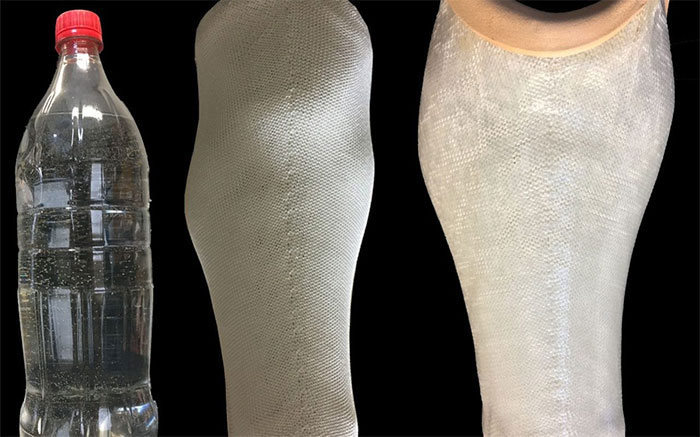Turn plastic bottles into arms and legs for the disabled
Turning plastic bottles into arms and legs for people with disabilities promises to be a breakthrough in the reuse of plastic products and practical support for life.
According to The Telegraph , a team from De Montfort University (UK) is initially successful in turning the plastic material obtained from empty water bottles into prosthetics for the disabled.
Especially, this new product weighs only 40% compared to the common prostheses on the market today in developed countries.
In terms of price, the invention also helps users to reduce costs by up to 500 times because each set costs only 10 pounds, much cheaper than standard products up to £ 5,000 on the market.

Five 1 liter plastic bottles can make an artificial leg - (Image: THE TELEGRAPH)
According to statistics, currently about 45,000 British citizens are dependent on the types of prosthetic limbs, with the total cost for production, maintenance and treatment across the country costing about 60 million pounds per year.
Meanwhile, recent reports have noted that, in just one minute, only 7% of global plastic waste is recycled, while the rest is mostly buried underground or discharged into the ocean.
Dr Karthikeyan Kandan - a member of the research team - said he and his colleagues have combined two seemingly unrelated issues into one: the need for used prosthetics and plastic bottles.
Previously, prosthetic limbs were mostly made of block plastic, rich in polyethylene but the disadvantage was heavy and unstable.
However, the new design is based on polyethylene terephthalate (PET) - which can be made from plastic bottles - which is 100 times more efficient but about half as strong as block plastic.
When testing prosthetics - especially shin parts - in PET plastic, first-time users thought the product was much cooler than the old plastic, making them more comfortable to move around.
Dr. Karthikeyan Kandan said that the team is currently preparing to conduct a large-scale survey with many designs of artificial limbs from this special plastic.
"Previously, plastic bottles were very difficult to recycle, even when they were considered synthetic waste instead of the second reusable type" - Dr. Karthikeyan Kandan said. Now, an average of five 1-liter plastic bottles can be recycled and provides enough material to produce a prosthetic tube.
Currently, the project receives a lot of support from organizations, companies, including the British Medical Science Institute.
- Plastic bottles - gold mines in Taiwan
- The habit of re-using plastic everyone does but brings unexpected harm
- A small 3D printing device that can help build houses with plastic bottles is easier than ever
- Don't inject plastic bottles to reuse many times, incalculable hazards
- Why is little beer packed in plastic bottles?
- Processing waste plastic bottles into phone cases
- The idea of water bottles made of jelly, decompose soon after use
- We are about to wear clothes made from plastic bottles
- Change plastic bottles to get bus and city tickets and clean and reduce traffic jams
- 2 secrets about plastic bottles of water that many people would wish for 'I'd rather not know'
- The scientist found a way to recycle plastic bottles into diesel
- Video: How to reuse plastic bottles with safe water
 Is the magnetic North Pole shift dangerous to humanity?
Is the magnetic North Pole shift dangerous to humanity? Washington legalizes the recycling of human bodies into fertilizer
Washington legalizes the recycling of human bodies into fertilizer Lightning stone - the mysterious guest
Lightning stone - the mysterious guest Stunned by the mysterious sunset, strange appearance
Stunned by the mysterious sunset, strange appearance